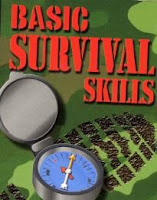Having survival skills is one of the ways to cope with catastrophe. Since we don’t know where a disaster may lead us, it is important to equip ourselves with the knowledge of surviving the unexpected. These skills will keep us focused and attuned to the needs of the situation.
 You don’t have to be a paramedic or a boy scout to know these skills. Basic survival skills are not required for the stronger or brighter people, but it should be a necessity for people from all walks of life. A disaster does not choose its victims, hence learning these skills is very important for one’s own protection.
You don’t have to be a paramedic or a boy scout to know these skills. Basic survival skills are not required for the stronger or brighter people, but it should be a necessity for people from all walks of life. A disaster does not choose its victims, hence learning these skills is very important for one’s own protection.
The topmost requirement or skill for each person is to have the right attitude. It is important not to panic when a calamity strikes. Although panicking is always the first instinct, you should always remember that it will not get you out from a chaotic situation. Instead, you have to concentrate, analyze the problem and determine all the possible solutions.
Being in an emergency or disaster means you are out of the comforts of your own home. You will probably find yourself in a location where you are directly exposed to many elements such as extreme temperature and animal attacks. This situation calls for your skills to build your own shelter. You will need to assess your environment, its potential dangers and how you may able to protect yourself. Your shelter should give you access to fire to give you body heat, night light and the ability to cook your own food. Having shelter and fire will give you a sense of security and ups your chance for survival.
Access to water is also important since a human can only last three days without it. One of the most important survival skills is to determine clean sources of water. You should also know if water from a source is potable and not contaminated. You should be able to sanitize your water before drinking it. Today, there are chemical ways to purify water, but if you find yourself in the most primitive conditions, boiling your water is still the best option.
Next to water comes the importance of food. It is believed that a healthy human can survive three weeks without it. However, finding yourself in a state of dire hunger can ruin your focus, thus you need the skill to look for food. If you run out of commercially-packed foods in your survival kit, you will need to learn to hunt and fish. You can also enrich yourself with botanical knowledge so you will be able to identify plants which are edible.
Your survival skills should also require first aid knowledge. Getting hurt from a calamity or in the wilderness may occur so you need to know how to address these situations. Ideally, you should know how to treat a wound, animal bites, hypothermia, and make a tourniquet. If you are creative enough, you should be able to produce a makeshift stretcher or crutches for the injured. These skills will come in handy not just in saving your own life, but also of others.
Your survival skills need constant honing and updating, but learning the basics should get you far enough until help comes in.
